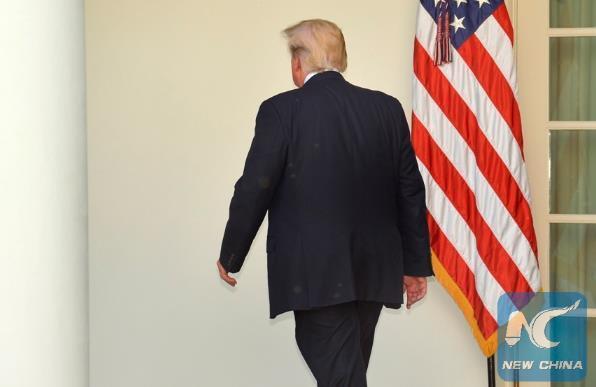Why the game is on: Paris climate deal
- By Niranjan Sahoo
 0 Comment(s)
0 Comment(s) Print
Print E-mail China.org.cn, June 5, 2017
E-mail China.org.cn, June 5, 2017
|
|
|
U.S. President Donald Trump leaves after delivering a speech at the White House in Washington D.C., capital of the United States, on June 1, 2017. U.S. President Donald Trump said on Thursday that he has decided to pull the United States out of the Paris Agreement, a landmark global pact to fight climate change. [Photo/Xinhua] |
Yet those who have been following his body language and moves for the last few months knew this was coming. In fact, this writer's previous column in this page had reasoned why Trump would chose to walk away from the Paris Accord. Those who had seen his March 28 Executive Order that reversed Barack Obama's climate and clean energy initiatives would know the next logical step. Without pulling out of Paris, he had no chance to replace Obama's clean energy initiatives.
The predictable reaction world over is that Trump's decision is whimsical and without sound judgment. Yet, his decision to pull out of Paris Accord is in accordance with his election pledge to protect the fossil fuel industry (i.e., coal), create manufacturing jobs in the rust belt states that strongly backed him to win.
Of course, many of Trump's moves on clean energy and climate change are being guided by Scott Pruitt, an energetic fossil-fuel campaigner who presently heads America's Environmental Protection Agency. This apart, last week some 22 Senators had argued for President Trump to withdraw from the Accord.
Such climate-wrecking decisions by the Trump administration would do permanent and irreparable damage to America's credibility, its international diplomacy and can encourage many fence sitters to back out from the fragile deal. In long run, the Paris pull out will have serious implications for broader U.S. engagement on a range of global issues including clean energy technologies and jeopardizes steps to raise finance for mitigation and control efforts.
Where does this leave out the rest of the world especially other bigger players on climate battle? Will China and the EU, two big players on climate combat shoulder more responsibilities? Where is India placed? While making the case for an American pull out, President Trump went on his vitriolic best. Mincing no words, Trump accused India and China of being the biggest beneficiaries of the Paris Accord as both countries have been allowed to build hundreds of additional coal plants until 2020. In a no hold barred attack, he accused India of extracting "billions and billions and billions" of dollars in foreign aid from the developed world to sign the Paris accord.
China taking over the global climate mantle
Yet, the American withdrawal does not mean the world will have less supporters. The positive thing is both Chinese and Indian leadership have chosen to ignore his spiteful remarks and hyperboles and have decided to show greater collective resolve to implement the pledges made in the deal.
Given Trump's economic orientation and strong anti-climate rhetoric during the course of electioneering, major nations were anticipating something of this kind. In fact, China and the European Union (EU) have come out with stronger resolve to push initiatives and resources to fulfill the goals enshrined in Paris Agreement.
Jean-Claude Juncker, the head of European Union, while holding a dialogue with Chinese Premier Li Keqiang made it clear that China and the EU are determined to step up their endeavors and "there is no reverse gear to the energy transition, there is no backsliding on the Paris agreement."
Note the response of China's Foreign Ministry spokesperson that regardless of what the U.S. administration does, "China would stick to its pledges on climate policies." Earlier this year, President Xi Jinping called the Paris Agreement "a hard-won achievement" and urged world leaders to adhere to their pledges to "safeguard the future of coming generations."
The American withdrawal provides China a rare opportunity to lead the global action against climate change. China which has integrated its climate pledges in the Five-Year Plan is today better placed to honor its pledges than any other country. It makes sense to recall that China has pledged to increase non-fossil fuels by 20 percent in its total energy mix by 2030. To do this, in statistical terms China has pledged to deploy a mammoth 800 to 1000 GW in non-fossil capacity. With installed capacity in solar going up 400 times 2005 levels, China is a serious contender to meet the UNFCCC target. Country's level of investment in renewables is unmatched by any nation including the U.S., a renewable energy leader. Thus, there is every possibility that China may turn the table on the climate battle.
To conclude, while the U.S. pull out would negatively impacts the global fight against climate disturbances in the short run, all indications from other major nations point that the collective fight is on and there is no going back on Paris deal. The most heartening news coming from the United States is that the vast majority of its states such as California and private enterprises including General Electrics, Apple, Tesla, Microsoft are on board with the Paris Accord. Thus, not everything is lost on Paris.
Niranjan Sahoo is a Senior Fellow of the Observer Research Foundation, New Delhi.
Opinion articles reflect the views of their authors, not necessarily those of China.org.cn.







Go to Forum >>0 Comment(s)